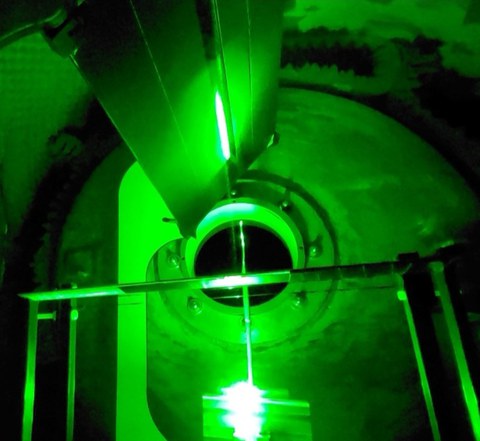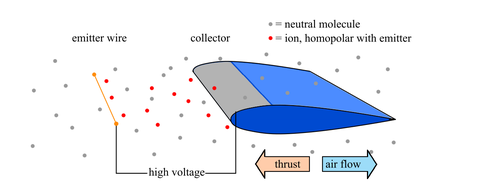06.12.2024
Forschungsprojekt IPROP: Ionen-Wind-Antriebe in der Stratosphäre

Particle Image Velocimetry (PIV) Messungen im Vakuum-Windkanal
Der Lehrstuhl für Flugmechanik und Flugregelung hat offiziell seine Arbeit am internationalen IPROP-Projekt aufgenommen, das sich auf innovative Forschung zu Ion-Wind-Thrusters (IWT) konzentriert. Ziel des Projekts ist es, das Verständnis und die Anwendbarkeit von IWT für High-Altitude-Platforms voranzutreiben, was deren Einsatz in verschiedenen Bereichen, von der Kommunikation bis hin zur Umweltüberwachung, revolutionieren könnte. Durch die Kombination von experimenteller aerodynamischer Forschung mit fortschrittlichen Regelungsstrategien unterstützt der Lehrstuhl das Erreichen dieses ehrgeizigen Ziels.
Ion-Wind-Thruster basieren auf dem Prinzip der Elektrohydrodynamik, bei dem ein elektrisches Feld einen Ionenstrom in einem fluiden Medium, typischerweise Luft, erzeugt. Dabei ionisiert ein Hochspannungsfeld an einer Emissionselektrode die umgebenden Luftmoleküle. Die entstandenen geladenen Teilchen werden zu einer Sammel-Elektrode entgegengesetzter Polarität beschleunigt, wodurch sie Bewegungsenergie auf neutrale Luftmoleküle übertragen. Dieser Impulstransfer erzeugt eine Schubkraft, den sogenannten Ionenwind, der für Antriebs- oder Strömungssteuerungszwecke ohne bewegliche Teile genutzt werden kann – eine effiziente und geräuschlose Technologie.
Höhenplattformen operieren in großer Höhe und damit unter atmosphärischen Bedingungen mit geringer Dichte. Um die Leistung des IWT unter diesen realistischen Bedingungen zu untersuchen, sind spezialisierte Einrichtungen notwendig. Unser Lehrstuhl verfügt über einen einzigartigen Vakuum-Windkanal, der präzise Tests des IWT unter Niederdruckbedingungen ermöglicht und die Weiterentwicklung dieser innovativen Technologie vorantreibt.
Dieses Projekt wurde im Rahmen des Forschungs- und Innovationsprogramms „Horizont Europa“ der Europäischen Union unter der Finanzhilfevereinbarung Nr. 101098900 gefördert.
Die hierin geäußerten Ansichten und Meinungen stammen jedoch ausschließlich von den Autor(en) und spiegeln nicht notwendigerweise die Ansichten der Europäischen Union oder der Europäischen Innovationsagentur für den Mittelstand (EISMEA) wider. Weder die Europäische Union noch die Förderbehörde können für diese verantwortlich gemacht werden.



